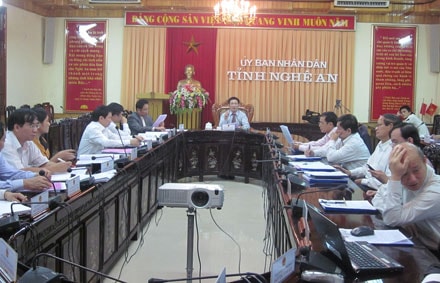Overcoming the shortage of human resources in the health sector and removing difficulties in building social housing
On the afternoon of October 20, the People's Committee of Nghe An province continued its regular October meeting to listen to and give opinions on two contents: the project on training and developing human resources for the health sector of Nghe An province in the period of 2011-2015 and the results of implementing the planning for development and housing solutions for low-income households in Vinh city and Cua Lo town. Comrade Ho Duc Phoc - Deputy Secretary of the Provincial Party Committee, Chairman of the Provincial People's Committee chaired the meeting.
(Baonghean) -On the afternoon of October 20, the People's Committee of Nghe An province continued its regular October meeting to listen to and give opinions on two contents: the project on training and developing human resources for the health sector of Nghe An province in the period of 2011-2015 and the results of implementing the planning for development and housing solutions for low-income households in Vinh city and Cua Lo town.
Comrade Ho Duc Phoc - Deputy Secretary of the Provincial Party Committee, Chairman of the Provincial People's Committee chaired the meeting.

In recent years, the province's health sector has received investment in all aspects and has made many improvements. However, human resources in the health sector, especially high-quality human resources, are in short supply at all three levels in all areas: prevention, medical examination and treatment, state management, and family planning and population. According to calculations, by 2015, the province's public health sector will lack about 572 doctors and 234 university pharmacists. By 2020, with the target of 9 doctors/10,000 people and 1.4 university pharmacists/10,000 people, the province will need 3,060 doctors and 408 university pharmacists.
To overcome this shortage, the health sector has proposed a number of solutions, including focusing on improving the management capacity of departments and divisions; training and developing high-quality human resources equally in localities and regions; opening links with medical and pharmaceutical universities to train community-based specialist doctors...
After listening to the recommendations and proposals of the health sector and the comments of related sectors, comrade Ho Duc Phoc suggested that the Department of Health complete and revise the project in the direction of clarifying the current shortage situation to calculate the number of missing medical staff, thereby making a plan to attract, receive, and retrain them with specific solutions, ensuring feasibility.
At this meeting, the Provincial People's Committee listened to and gave opinions on the implementation of housing development policies for low-income people in Vinh City and Cua Lo Town. According to the report of the Department of Construction, currently only 3 housing projects for low-income people in Vinh City have been implemented, including 3 houses with 194 apartments out of a total of 10 social housing projects approved by the Provincial People's Committee. The current difficulty is that although there have been many documents outlining many criteria and preferential policies from both the central government and Nghe An province for investment in housing projects for low-income people, many businesses have registered but are slow to implement or not implementing. Due to not being able to borrow preferential capital from the Vietnam Development Bank, being forced to borrow capital from commercial banks with high interest rates has increased the cost of apartments while the target buyers are low-income people, so many investors are not interested in investing in this type of housing.
The Department of Construction recommends establishing a “housing development fund” to invest in social housing projects with loans. The fund’s capital is drawn from the proceeds from selling and renting state-owned houses in the area, deducting at least 10% from land use fees of commercial housing development projects and new urban area projects in the area; annual local budget support according to the decision of the Provincial People’s Council; money mobilized from legal capital sources; support money, voluntary contributions from organizations and individuals. On the investor’s side, it is required to apply new construction technology to minimize product costs.
Concluding the meeting, comrade Ho Duc Phoc requested relevant departments and units to promote administrative reform in price approval procedures, object approval, and do a good job of examining basic designs. The Provincial People's Committee will not approve new projects and at the same time require investors of the remaining 7 projects to comply with their commitments on building housing for low-income people.
Khanh Ly






